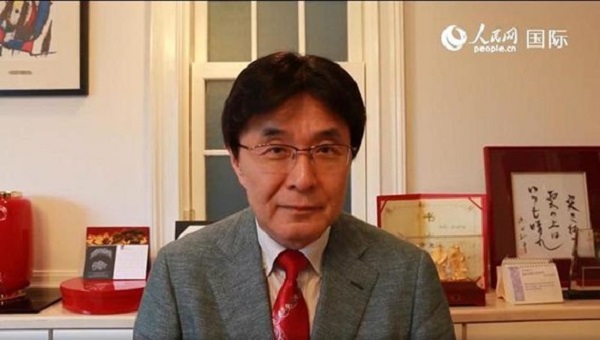Chinese path to modernization sets example for developing countries: Japanese scholar
The Chinese path to modernization put forward in the report to the 20th National Congress of the Communist Party of China (CPC) will help China advance the great rejuvenation of the Chinese nation while providing an approach to economic development for developing countries, said Kazuyuki Hamada, a Japanese international political economist.
The former member of the House of Councillors and former Parliamentary Vice-Minister for Foreign Affairs of Japan said that the world today faces multiple challenges such as environment, food and energy risks, and growing risks of pandemic, trade frictions, terrorism and war. American-style democracy and market economy have stagnated. Japan, the U.S. and European countries are barely able to handle their own problems, let alone effectively address global issues, said Hamada, who obtained a Ph.D. in political science from George Washington University.

Photo shows Kazuyuki Hamada, a Japanese international political economist. (People’s Daily Online/courtesy of the interviewee)
Despite such a serious situation, a Chinese path to modernization has not only proceeded from China's own national conditions, but has also provided plans to deal with global issues, which is grand and flexible and worth the attention of the world, Hamada observed. He singled out China's achievements in eradicating absolute poverty and improving food production, saying they are of epoch-making significance and worth learning for the vast majority of developing countries.
Modernization of common prosperity for all, an important feature of Chinese modernization mentioned in the report to the 20th CPC National Congress, has drawn widespread attention from all circles in Japan, Hamada noted, expressing the hope that Japan and China will cooperate in the new era and push for real modernization.
Compared to Japan's economy, which has come to a halt, China's economy still has huge potential. He cited that the impressive spending power of Chinese tourists greatly benefited Japan’s tourism, home appliance, cosmetics and drug industries before the outbreak of the COVID-19 epidemic. For this reason, China's decisions to promote high-standard opening up and make appropriate reductions to the negative list for foreign investment stated in the report have been welcomed in Japan's economic circles.
China is the largest trading partner of Japan. Hamada believes that the Chinese market is more important than that of the U.S., and Japan's technologies and experience can play an important role in China's pursuit of modernization. He hoped both countries will take the 20th CPC National Congress as an opportunity to expand cooperation in investment, trade and other areas.
On the subject of environmental issues, Hamada said climate change is having a profound impact on both China and Japan. He called on both countries to cooperate on policies that ensure climate security and play a leading role in Asia.
He envisaged cooperation between the two countries in such areas as environmental protection related to marine resources exploration, clean technology for achieving carbon neutrality, and water purification and soil improvement related to food security management, as well as the building of complementary systems, saying that this will have a positive impact on the whole world.
When it comes to future relations between the two countries, he acknowledged that improving ties with China is an unavoidable issue. Hamada noted that the U.S. urged Japan to join its encirclement drive against China, and asserted that if Japan has no independent foreign policies with Asian countries, then it cannot realize real independence, while emphasizing the need to strengthen friendly ties with China and other Asian countries.
He believes that improving relations between two culturally similar countries starts with improving the bonds between the two peoples, and adds that mutual understanding between the two countries’ people and culture is key to bilateral relations.
The two peoples should start with the young generation and create opportunities to understand the differences and the things they have in common, which is crucial, he remarked.
Photos
Related Stories
- Chinese FM calls for joint efforts to make China-Japan relationship fit for new era
- China urges Japan to be cautious in words and deeds in military, security fields: FM spokesperson
- Premier Li says sound, stable China-Japan ties serve interests of both sides
- Symposium held to enhance China-Japan friendship
- Interview: Japan, China should be backbone of building community with shared future for mankind -- former Japanese PM
- Interview: Decoupling from China would put Japanese companies at risk of survival: Japanese economist
- Feature: Terracotta Warriors exhibition highlights cultural bond between China, Japan
- Exports a top priority for Japan, and China can help
- Sino-Japanese talks gather momentum
- Japanese PM fires scandal-tainted internal affairs minister: local media
Copyright © 2022 People's Daily Online. All Rights Reserved.









